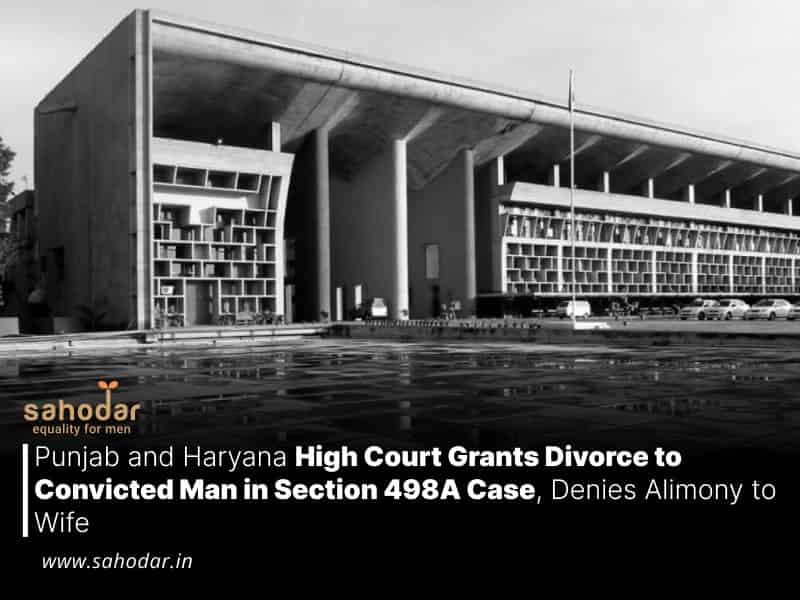Though the Court denied permanent alimony to the woman, it directed the man to pay a monthly amount of ₹10,000 to their daughter.
The Punjab and Haryana High Court recently granted a divorce to a man despite his conviction under Section 498-A of the Indian Penal Code, which deals with cruelty by a husband or his relatives towards his wife.
The division bench, comprising Justice Sureshwar Thakur and Justice Sudeepti Sharma, ruled that the husband’s conviction in the case filed by the wife constituted cruelty, making it untenable for him to continue living with her.
“A perusal of the present case shows that respondent- wife lodged an FIR against the appellant/husband, resulting in the appellant’s conviction. This action of respondent/wife constitutes cruelty, as it is practically impossible for the party against whom FIR is lodged or case is registered to live together under one roof. Consequently, this situation amounts to mental cruelty inflicted on the appellant/husband by the respondent/wife,” the Court said.
The Court also observed that while the woman had alleged cruelty by her in-laws, they were acquitted.
“Since the appellant/petitioner was convicted, though the parents were acquitted but still the harassment faced by the family amounts to cruelty on the part of the respondent-wife,” it said.
Interestingly, while siding with the husband, the Court also mentioned that the wife would not receive any permanent alimony because of her overall behavior.
“The harm which is caused by her to the appellant/husband by lodging the FIR which led to his conviction leaves a stigma of being convicted on the appellant/husband which amounts to mental cruelty,” it said.
In this case, the couple married in 2004 and had a child in 2005. In 2007, the wife filed a police case against the husband under several sections of the Indian Penal Code and the Dowry Prohibition Act.
The husband then asked for a divorce in 2009, claiming desertion and cruelty. However, the Family Court turned down his request in 2018.
In appealing to the High Court, the husband said that he and his wife had been living apart for 19 years. He argued that because of his criminal conviction and sentence, living with his wife was not possible.
The wife, however, stated that she still wanted to live with him.
The Court questioned the wife’s claim, noting that if she wanted to stay with him, she should have filed for restitution of conjugal rights instead of pursuing a criminal case.
“Learned Court below has dismissed the divorce petition on the ground that since the appellant instituted a petition for Restitution of Conjugal Rights in the year 2007, therefore, the acts of cruelty of respondent wife were condoned by the appellant/petitioner. Further that allegations of cruelty levelled by the appellant/petitioner against the wife remained unproved, whereas the Court did not observe that in fact it would amount to cruelty on the part of the respondent/wife,” it noted further.
In appealing to the High Court, the husband said that he and his wife had been living apart for 19 years. He argued that because of his criminal conviction and sentence, living with his wife was not possible.
The wife, however, stated that she still wanted to live with him.
The Court questioned the wife’s claim, noting that if she wanted to stay with him, she should have filed for restitution of conjugal rights instead of pursuing a criminal case.
“In the present case, the emotional foundation of the marriage has completely vanished. The course which has been adopted by the Family Court below would encourage continuous bickering, perpetual bitterness and may lead to immorality. If the Courts find that there is practically no possibility of their staying together and the marriage has been irretrievably broken as seen in the present case, then a decree of divorce should be granted,” it said.
The Court noted that the wife’s filing of an FIR against the husband was seen as cruelty. It also pointed out that the couple had been living apart for about 19 years without any attempts to reconcile.
This proved that the marriage was beyond repair, leading the Court to dissolve it.
While the Court did not grant permanent alimony to the wife, it ordered the husband to pay ₹10,000 a month for their daughter.
“After marriage of the daughter, both the parents shall be duty bound to look into the needs of the daughter and to give love and affection to her,” it ordered further.
Senior Advocate GS Punia and advocate Harveen Kaur represented the husband.
Advocate Sarabjit Singh represented the wife.

